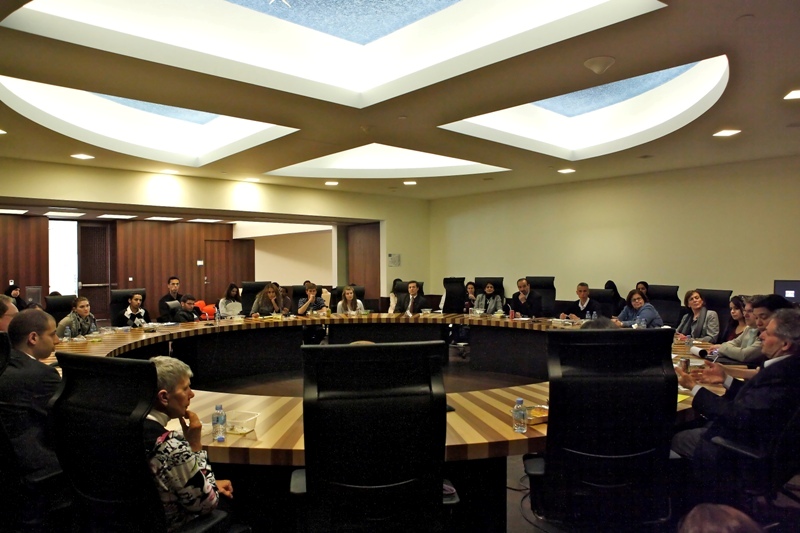Background and Scope of the Project

Certain streams of scholarship have suggested that conflicts around sectarian identity lie at the very crux of Middle Eastern politics. Sectarianism may be broadly defined as the process through which forms of ethnic and/or religious identity are politicized. While certain scholars overemphasize the enduring ideological divides in the region and their continuing influence on socio-political instability, others downplay their significance entirely. There are those who argue that sectarian issues in the region are not the age-old dilemmas that they are often perceived as, but rather are a modern phenomenon, and that sectarian affiliation was not a particular marker of identification nor a cause for open conflict a century ago.
While there can be no single-factor explanation of Middle Eastern politics, the fact remains that identity on the basis of a common national affiliation has often been a contested realm in the Middle East. Sectarian identifications have impacted on the fractious course of modern politics in the region, with visible repercussions felt within both the domestic and international spheres. In one form or the other, contemporary Middle Eastern states have often had to confront transnational ideologies and identities.
There are estimated to be some 2 million Shia within the six states of the Gulf Cooperation Council. In Bahrain, the Shia citizens vastly outnumber Sunni; Kuwait has a sizeable 25-30% Shias; and Yemen’s Shia Zaydis account for about 25% of the population. The four remaining GCC states also have minority Shia populations of roughly around 10-20%. The numbers for the Persian Gulf in total are much greater when including the Shia populations of Iran (70 million) and Iraq (22 million).
Undoubtedly, reverberations from the dramatic uprisings in the Arab world are being felt throughout the Persian Gulf. The ongoing situation in Bahrain is one recent locus that has brought the dynamics of sectarian politics back to the forefront of the discussion. There is potential for the situation in Bahrain to actively enflame sectarian sentiments across the region. Questions arise around whether it may be a deliberate regime strategy to frame the Bahrain protest movement as Sunni-Shia conflict and also whether the anti-Shia rhetoric that has been vociferously spreading through Arab media outlets, particularly through the dominant Saudi news channels, may be a consequence of existing geopolitical realities and rivalries.
Scope of the Project
With the reinvigoration on the subject brought about by current events, CIRS launched a new research initiative on the “Sectarian Politics in the Gulf.” The central aim of this study is to examine the dynamic ways in which evolving sectarian identities and politics in the Gulf region intersect. Encompassing Iran and the states of the Arabian Peninsula, the research project will include topics that focus on how sectarian issues play out in the realms of domestic politics within Gulf states, as well as those that address sectarianism’s impact on inter-state relations within the region. This project brings together a renowned group of scholars to examine the issues of religious, communal, and ethnic identities in the Persian Gulf, and how these impose themselves on both the domestic and international politics of the Gulf.
One of the aims of our research project will be to determine the extent to which sectarian identity is salient to the ongoing political developments within the Gulf. The dynamics of sectarianism have changed dramatically over recent decades in the Gulf, corresponding often to political upheavals within the region. The Arab revolts that began in the spring of 2011 have largely been secular in their spirit and nature. Given that the final chapters of the “Arab Spring” are yet to be written, the nature and consequences of the intersection between sectarian identities and politics in the Gulf remains to be seen. Nevertheless, our research will highlight some of the most critical dynamics and patterns that are beginning to emerge in the region’s sectarian politics.
Amongst other topics, some of which we aim to address through the “Sectarian Politics in the Gulf” research initiative are:
- Sunnism and State-Building in the Arabian Peninsula
- Rentier Politics and Sectarian Identity in the Persian Gulf
- Shia Politics in Iraq
- Iraqi Kurds
- Ethnic Politics in Iran
- The Shia in Kuwait
- The Kuwaiti Badu
- Shia Identity and Politics in Bahrain
- The Saudi Shia
- The Political Consequences of Yemen’s Ethnic Mosaic
Participants in the “Sectarian Politics in the Gulf” research initiative are:
- Mohammad Akbar – American University of Kuwait
- Aziz Al Fahad – Kingdom of Saudi Arabia
- Mohammed Al Ghanim – Georgetown University
- Sultan Al Hashmi – Sultan Qaboos University
- Ghanim Al Najjar – Kuwait University
- Lois Beck – Washington University in St. Louis
- Kristin Smith Diwan – American University
- Khaled Fattah – Lund University
- Justin Gengler – Social & Economic Survey Research Institute, Qatar University
- Fanar Haddad – University of London
- Mehran Kamrava – Georgetown University School of Foreign Service in Qatar
- Laurence Louer – CERI, France
- Roel Meijer – Radboud University, The Netherlands
- Gwenn Okruhlik – Trinity University
- J. E. Peterson – University of Arizona
- Lawrence Potter – Columbia University
- Guido Steinberg – German Institute for International and Security Affairs
- Marc Valeri – University of Exeter
Notes
- Vali Nasr, The Shia Revival: How Conflicts Within Islam Will Shape the Future. (W. W. Norton, 2006).
- Augustus Richard Norton, “The Shiite ‘Threat’ Revisited,” Current History, December 2007, p. 436.
- Gregory Gause, “Systemic Approaches to Middle East International Relations,” International Studies Review, Vol. 1, No. 1, (1999), p. 23.
- Pew Report 2009. Mapping the Global Muslim Population. Available at: http://pewforum.org/Mapping-the-Global-Muslim-Population.aspx
- Greg Gause, “Is Saudi Arabia Really Counter Revolutionary?” Foreign Policy, August 09, 2011. http://mideast.foreignpolicy.com/posts/2011/08/09/is_saudi_arabia_really…
- For more on this see: http://english.aljazeera.net/indepth/opinion/2011/03/201132982742988712….http://www.guardian.co.uk/commentisfree/2011/aug/20/bahraini-uprising-iran
Article by Zahra Babar, CIRS Project Manager